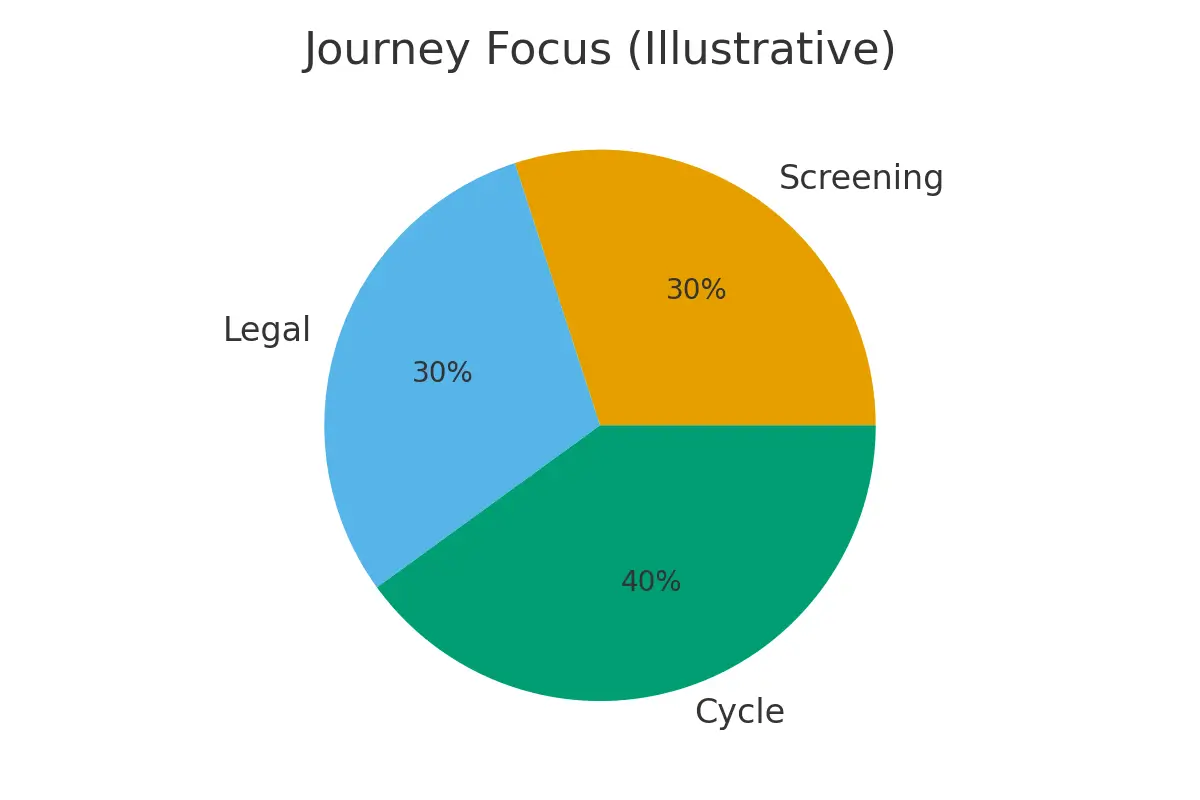
This article explains legal contracts — what to include and why within the Donor Options (Eggs vs Embryos vs Sperm) pathway. We focus on practical choices that affect outcomes, budgets, responsibilities, timelines, and long-term clarity—so you can move forward with confidence.
What It Is
Legal Contracts — What to Include and Why in plain English:
the written agreements that define rights, responsibilities, expectations, and protections when using donor eggs, sperm, or embryos. These contracts prevent misunderstandings, secure parentage, reduce future disputes, and ensure all parties—donor, recipients, and future child—are legally protected.
Upstream legal clarity avoids downstream breakdowns such as cycle delays, questions about custody, uncertainty about future contact, and financial surprises.
Who It Helps
This pathway benefits:
- Individuals and couples using any form of donor gametes or embryos
- Those working with known donors such as friends or family
- Recipients using anonymous or open-ID donors from banks or agencies
- Anyone concerned about rights, responsibilities, disclosure, or boundaries
- Patients with complex histories—prior losses, genetic conditions, or multi-cycle paths
It also identifies when to choose a different pathway, based on age, partner factors, medical history, genetic findings, psychological readiness, or family dynamics.
Step-by-Step
A simple sequence designed to reduce confusion and keep the timeline predictable:
- Early consultation with a reproductive lawyer — ideally before matching with a donor.
- Share medical and screening context so the lawyer can personalize the contract.
- Draft agreement covering rights, responsibilities, payment terms, future contact, and confidentiality.
- Independent legal counsel for the donor — required to protect consent and avoid coercion.
- Review, revisions, and final signatures before any medications or cycle coordination begin.
- Clinic confirmation — the clinic receives the legal clearance letter.
- Proceed to cycle planning once all parties have executed agreements.
Each step prevents last-minute delays and safeguards the full treatment process.
Pros & Cons
Pros
- Provides legal certainty for parentage
- Defines financial responsibilities clearly
- Prevents misunderstandings between donor and intended parents
- Protects the donor’s rights and boundaries
- Clarifies future contact, updates, and disclosure expectations
Cons
- Upfront legal costs
- Requires time for drafting and review
- Some known donors may feel intimidated by legal formality
- Laws vary by region, requiring specialized attorneys
Costs & Logistics
Typical line items include:
- Legal drafting for intended parents
- Independent counsel fees for the donor
- Contract amendments if clinical or personal circumstances change
- Legal clearance letters for the clinic
- Costs related to establishing parentage or birth-order filings (if required locally)
- Agency fees for anonymous donor contracts
Good planning includes confirming:
- Which fees are fixed vs variable
- What insurance may or may not cover
- Payment deadlines to avoid treatment delays
- A simple cash-flow plan to prevent surprise costs
What Improves Outcomes
Key actions that make a real difference:
- Completing all legal contracts before medical steps begin
- Ensuring independent legal counsel for the donor
- Clear language around future contact, updates, and identity disclosure
- Including plans for remaining embryos—disposition, storage, and future use
- Aligning legal and clinical teams early
- Documenting how unexpected events (death, separation, health changes) will be handled
Actions that rarely help:
- Relying on verbal agreements
- Using generic online templates not tailored to reproductive law
- Rushing contract review to “save time”
- Focusing only on payment terms instead of long-term clarity
- Case Study
A couple pursuing embryo donation received a draft agreement late in the process. The donor was open to future contact, but the recipients expected anonymous boundaries. With structured legal guidance, the contract clarified communication preferences, medical history updates, embryo disposition, and parentage rights. The clear, early agreement prevented emotional friction, ensured the clinic released the embryos on time, and helped the recipients move forward confidently with their transfer schedule.
Mistakes to Avoid
- Starting medications before contracts are finalized
- Assuming known donors “don’t need legal steps”
- Omitting details about future contact or identity disclosure
- Not addressing embryo disposition for unused embryos
- Overlooking partner consent and related legal forms
- Using non-specialist lawyers unfamiliar with reproductive law
- Delaying legal clearance until the cycle is nearly underway
FAQs
Q. Why do clinics require legal contracts before starting treatment?
Ans. Because they protect all parties, define parentage, and prevent disputes that could delay or block treatment.
Q. Does a known donor need their own lawyer?
Ans. Yes. Independent legal counsel ensures genuine consent and protects the donor’s rights.
Q. What if we want an open-ID arrangement?
Ans. This must be clearly written into the contract, including expectations for future contact and how/when updates will be shared.
Q. Can contracts cover remaining embryos?
Ans. Absolutely—embryo disposition is one of the most important sections and must address storage, future use, and decision-making.
Q. How long does the legal process usually take?
Ans. Typically 1–4 weeks depending on lawyer availability, contract complexity, and how many revisions are needed.
Next Steps
- Free 15-min nurse consult
- Upload your labs
- Get a personalized cost breakdown for your case
Related Links

Dr. Kulsoom Baloch
Dr. Kulsoom Baloch is a dedicated donor coordinator at Egg Donors, leveraging her extensive background in medicine and public health. She holds an MBBS from Ziauddin University, Pakistan, and an MPH from Hofstra University, New York. With three years of clinical experience at prominent hospitals in Karachi, Pakistan, Dr. Baloch has honed her skills in patient care and medical research.





